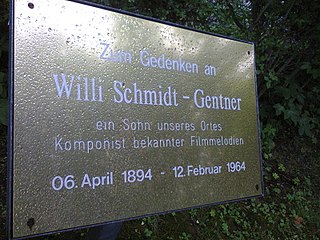
Paula Anna Maria Wessely was an Austrian theatre and film actress. Die Wessely, as she was affectionately called by her admirers and fans, was Austria's foremost popular postwar actress.

Attila Hörbiger was an Austrian stage and movie actor.

Hans Moser was an Austrian actor who, during his long career, from the 1920s up to his death, mainly played in comedy films. He was particularly associated with the genre of the Wiener Film. Moser appeared in over 150 films.

Heinrich Wilhelm "Heinz" Rühmann was a German film actor who appeared in over 100 films between 1926 and 1993. He is one of the most famous and popular German actors of the 20th century, and is considered a German film legend. Rühmann is best known for playing the part of a comic ordinary citizen in film comedies such as Three from the Filling Station and The Punch Bowl. During his later years, he was also a respected character actor in films such as The Captain from Köpenick and It Happened in Broad Daylight. His only English-speaking movie was Ship of Fools in 1964.

Karl Farkas was an Austrian actor and cabaret performer.
Wien-Film GmbH was a large Austrian film company, which in 1938 succeeded the Tobis-Sascha-Filmindustrie AG and lasted until 1985. Until 1945 the business was owned by the Cautio Trust Company, a subsidiary of the German Reichsfilmkammer, and was responsible for almost the entire production of films in the territory of the Ostmark, as Austria was called at that time.
Hans Emil Thimig, pseudonym: Hans Werner was an Austrian actor, film director, and stage director.
Eduard von Borsody was an Austrian cameraman, film editor, film director, and screenplay writer.
Julius von Borsody was an Austrian film architect and one of the most employed set designers in the Austrian and German cinemas of the late silent and early sound film periods. His younger brother, Eduard von Borsody, was a film director in Austria and Germany. He is also the great-uncle of German actress Suzanne von Borsody.

Karl Hartl was an Austrian film director.

Theo Lingen, born Franz Theodor Schmitz, was a German actor, film director and screenwriter. He appeared in more than 230 films between 1929 and 1978, and directed 21 films between 1936 and 1960.

Emil-Edwin Reinert, or Emile-Edwin Reinert, was a French film director, screenwriter, audio engineer and producer.

Willy Schmidt-Gentner was one of the most successful German composers of film music in the history of German-language cinema. He moved to Vienna in 1933. At his most productive, he scored up to 10 films a year, including numerous classics and masterpieces of the German and Austrian cinema.

Wiener Film is an Austrian film genre, consisting of a combination of comedy, romance and melodrama in a historical setting, mostly, and typically, the Vienna of the late 19th and early 20th centuries. The Wiener Film genre was in production between the 1920s and the 1950s, with the 1930s as its high period.
Ernst Marischka was an Austrian screenwriter and film director. He wrote for more than 90 films between 1913 and 1962. He also directed 29 films between 1915 and 1962. He wrote and directed the Sissi trilogy - Sissi (1955), Sissi – The Young Empress (1956) and Sissi – Fateful Years of an Empress (1957). The films were based on the life of Empress Elisabeth of Austria. He was the brother of Hubert Marischka. He was named for the Academy Award for Best Original Screenplay in 1946, for A Song to Remember (1945).
Artur Semyonovich Berger was an Austrian-Soviet film architect and set designer. He was active in Austria between 1920 and 1936, during which time he worked on about 30 feature films. In 1936 he emigrated to the Soviet Union, where he continued to work on films until the early 1970s.

Paul Hörbiger was an Austrian theatre and film actor.
Schrammeln is a 1944 German film directed by Géza von Bolváry.
Vienna 1910 is a 1943 German biographical film directed by Emerich Walter Emo and starring Rudolf Forster, Heinrich George, and Lil Dagover. It is based on the life of Mayor of Vienna Karl Lueger. Its antisemitic content led to it being banned by the Allied Occupation forces following the Second World War.

Last Stop is a 1935 German romantic comedy film directed by E. W. Emo and starring Paul Hörbiger, Hans Moser, and Josefine Dora. It was filmed and set in Vienna.











